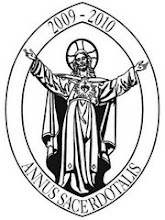 The Sisters of the Gospel of Life have a great post about Pope Benedict's homily on the Family, given during his visit to the Holy Land, which I reproduce here, with my own emphases, whilst acknowledging the difficulties in selecting text for emphasis. When the Holy Father speaks, every word is important. Thank you, Sisters.
The Sisters of the Gospel of Life have a great post about Pope Benedict's homily on the Family, given during his visit to the Holy Land, which I reproduce here, with my own emphases, whilst acknowledging the difficulties in selecting text for emphasis. When the Holy Father speaks, every word is important. Thank you, Sisters.In his homily, the Holy Father affirmed that, following the example of Mary, Joseph and Jesus, “we come to appreciate even more fully the sacredness of the family, which in God’s plan is based on the lifelong fidelity of a man and a woman consecrated by the marriage covenant and accepting of God’s gift of new life.
“How much the men and women of our time need to re-appropriate this fundamental truth, which stands at the foundation of society, and how important is the witness of married couples for the formation of sound consciences and the building of a civilisation of love”, he added.
“In the family each person, whether the smallest child or the oldest relative, is valued for himself or herself, and not seen simply as a means to some other end. Here we begin to glimpse something of the essential role of the family as the first building block of a well-ordered and welcoming society. We also come to appreciate, within the wider community, the duty of the State to support families in their mission of education, to protect the institution of the family and its inherent rights, and to ensure that all families can live and flourish in conditions of dignity”.
“In the town of the Annunciation”, the Holy Father proceeded, “our thoughts naturally turn to Mary, ‘full of grace’. … Nazareth reminds us of our need to acknowledge and respect the God-given dignity and proper role of women, as well as their particular charisms and talents. Whether as mothers in families, as a vital presence in the workforce and the institutions of society, or in the particular vocation of following our Lord by the evangelical counsels of chastity, poverty and obedience, women have an indispensable role in creating that ‘human ecology’ which our world, and this land, so urgently needs: a milieu in which children learn to love and to cherish others, to be honest and respectful to all, to practice the virtues of mercy and forgiveness”.
He also noted how from St. Joseph’s “strong and fatherly example” Jesus “learned the virtues of a manly piety, fidelity to one’s word, integrity and hard work. In the carpenter of Nazareth he saw how authority placed at the service of love is infinitely more fruitful than the power which seeks to dominate. How much our world needs the example, guidance and quiet strength of men like Joseph!”




No comments:
Post a Comment